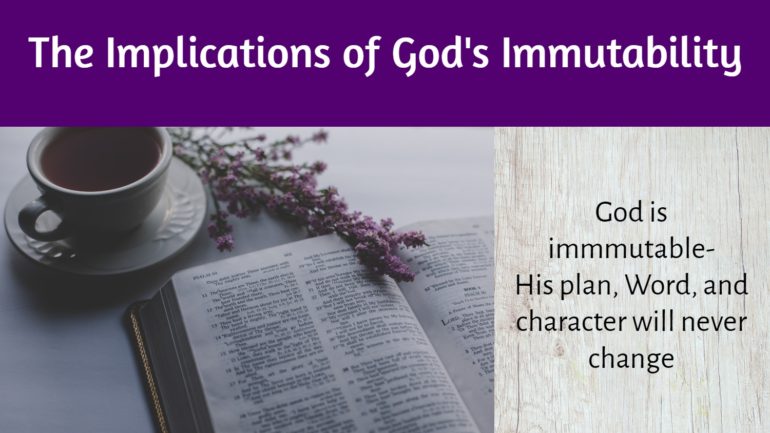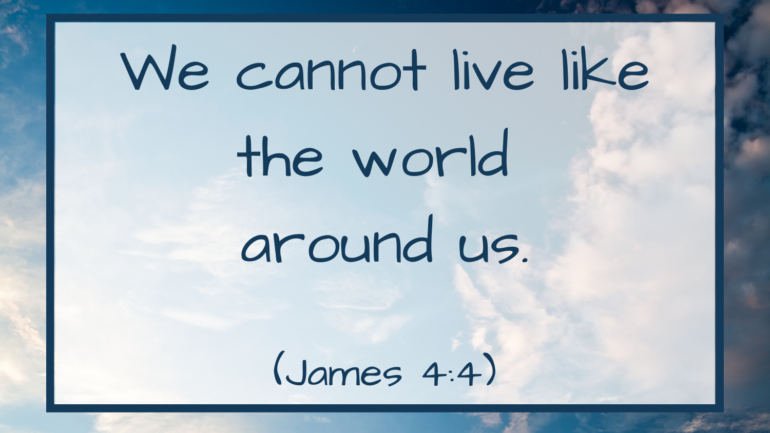God’s immutability means that God does not change, not is He capable of change. His plan, character, and Word will always remain the same.
We live in a world that is constantly changing. Our bodies change as we grow older. Our family changes as new additions are added, and loved ones pass away. Friendships change as we grow apart or move away from the friends that we were once so close to. The world certainly changes with each new election, and with the shifting tide of public opinion. The only thing that we can depend on is that nothing stays the same.
Nothing, that is, except God. God does not change. He is immutable. Not only does God not change, He is not even capable of changing. As Joel James says, “It is impossible for Him to change for the better; He is already perfect. He can’t change for the worse; His perfection won’t allow it. For us change is constant; for God, change is unknown.” What exactly about God does not change? Let’s look at three areas in particular.
The Extent of God’s Immutability
God’s Character Does Not Change
Have you ever run into someone that you knew long ago, maybe even were close to, only to be surprised at how different they were than what you remembered? As we age, we change—hopefully, for the better. We should become wiser, more mature, more patient and loving. Some people, however, change for the worse. Some older people become bitter and angry over the hardships or wrongs that they’ve had to endure. The point is, though, people never stay the same. Our personalities, interests, affections all change over time.
What it would be like if God changed? We wouldn’t know from day to day if God was going to be good or evil. Over time, He might become frail or forgetful. We couldn’t trust God and depend on Him if we never knew for sure what He would expect from us each day. That is a pretty scary thought.
Fortunately, that’s not the case. God says about Himself, “I the LORD do not change” (Malachi 3:6). God’s character and nature never change. He is today the same as He’s been from the beginning, and He’ll forever be the same as He is today. We don’t have to worry about Him slowly becoming evil. We don’t have to worry about Him becoming weak and unfit to rule His universe. He’ll never forget the promises that He’s made. He’ll never decide to change His definition of sin or righteousness. We can always know what to expect from God. We can also always know exactly what He expects from us.
God’s Plan Does Not Change
Still on Plan A
God devised a plan before time began. He chose to create for Himself a people that would love Him and glorify Him forever. There are many times throughout Scripture when it seems like this plan was derailed. Adam and Eve sinned. The Israelites chose to follow foreign gods. Jesus was crucified, His apostles executed, and His other followers scattered. Some might think that these events caught God off guard, forcing Him to abandon His plan A and move on to plan B, or C, or D, or whatever.
But that’s not the case. According to Psalm 33:1, “The counsel of the LORD stands forever, the plans of his heart to all generations.” God is still on plan A. He’s never had another plan, and He’ll never need one, because nothing catches Him off guard. Everything that has happened was all part of His original plan. He knew that mankind would sin and need a Savior. Sending Jesus to die on the cross for our sin was part of His plan from the very beginning.
Same Plan for All Time and All People
This means that God’s plan of salvation doesn’t change over time or from culture to culture. Every person that has ever been saved was saved in exactly the same way—by faith in Christ alone. Some people wonder, what about those in the Old Testament? Weren’t they saved by keeping the law or by making the proper sacrifices?
No, they weren’t. The law was designed to point out man’s sin. No one was able to keep the law perfectly, so it pointed to the need for One who could obey in our place. The sacrifices were merely symbolic. They were never sufficient to completely atone for anyone’s sin, which is why they had to be repeated over and over again. They pointed to the need for a Sacrifice whose blood could cover our sins once and for all. Those things all pointed to Christ. Those saved in the Old Testament were saved by looking forward in faith for this coming One, believing that He would save them.
Same Plan for Us
We are also saved by faith in the One who obeyed the law perfectly, yet gave Himself as a sacrifice in our place to atone for our sin. They looked ahead to this, while we look back on it. But Christ’s death on the cross was the only thing that could appease God’s wrath and pay the penalty for our sin. That was God’s plan all along.
So, because God’s plan doesn’t change, we can place our trust and our hope in Him. We can be confident that if we have placed our faith in Him, we will be saved. He won’t change His mind, or the requirements for salvation. He won’t suddenly stop loving us, or forget that we belong to Him. “God is marvelously constant…” says Joel James, “completely faithful, utterly dependable, and totally predictable, and that’s strong encouragement to put all your trust in Him.”
God’s Word Does Not Change
Isaiah 40:8 says, “The grass withers, the flower fades, but the word of our God will stand forever.” Many deny this. They say that God’s Word, the Bible, is outdated and irrelevant for our lives today. People do not want to admit their sin. If the Bible calls what they are doing sin, they the Bible must be wrong, not their behavior.
God is our standard for truth and goodness and all other things. He’s revealed that through Scripture, so Scripture then becomes our standard. It has the final say on what’s right and wrong. We can try to twist it to say what we want, but that doesn’t change the truth. One of my favorite sayings is, ‘The truth is still the truth even if no believes it. A lie is still a lie even if everyone believes is.” The truth doesn’t change based on popular opinion, and neither does God’s Word.
That should be a great comfort, because that means the promises made in Scripture are for us too, most of them, anyway. Some were made specifically to the nation of Israel, but most were for all of God’s children. So, when He says that He will love us forever, that He’ll forgive our sins, that He’ll always be with us, and that He’s preparing us a home with Him in heaven, we can believe it.
Doesn’t the Bible Say…
What about those passages of Scripture that talk about God regretting a decision or changing His mind? How can those passages be true if God is really immutable?
Let’s look at a few:
- And the Lord regretted that he had made man on the earth, and it grieved him to his heart. Genesis 6:6
- And the Lord relented from the disaster that he had spoken of bringing on his people. Exodus 32:14
- Did Hezekiah king of Judah and all Judah put him to death? Did he not fear the Lord and entreat the favor of the Lord, and did not the Lord relent of the disaster that he had pronounced against them? But we are about to bring great disaster upon ourselves.” Jeremiah 26:19
- The Lord relented concerning this: “It shall not be,” said the Lord. Amos 7:3
- When God saw what they did, how they turned from their evil way, God relented of the disaster that he had said he would do to them, and he did not do it. Jonah 3:10
Human Language
Sometimes the authors of Scripture speak about God in human terms that we can understand, such as in Genesis 6:6, where it says that God regretted what He did. But what about the passages where God threatens judgment, but then relents? How do we reconcile that with the passages that say God will not change His mind? For example, 1 Samuel 15:29 says, “The Glory of Israel will not lie or change His mind; for He is not a man that He should change His mind”
A Clause of Mercy
When God promises judgement or calamity against a person or nation, He usually inserts a clause promising mercy if that person or nation should repent. Even when that clause is absent, though, it’s still implied, as we see in Jeremiah 18:7-8:
If at any time I declare concerning a nation or a kingdom, that I will pluck up and break down and destroy it, and if that nation, concerning which I have spoken, turns from its evil, I will relent of the disaster that I intended to do to it.
God always gives people a chance to repent. However, He knows beforehand what choice they will make. His plans are already made. Their choice to repent or not does not really change God’s mind or His plan. It’s all part of His will.
Implications of God’s Immutability
We can be confident in our salvation.
There are many who claim to be Christians yet deny that you can really know if you are saved. They believe that they can lose their salvation by not doing enough or by sinning badly enough. However, it is possible to know beyond a doubt that you are saved. God has laid out for us the method by which we must come to Him. That method never changes. He has promised that those whom He loves will never be separated from Him, so His love for us never changes. Jesus said that those whom the Father gave Him will never be lost. Because God doesn’t change and His Word doesn’t change, we can confidently place our faith in Him to do what He has said He will do.
We can be confident in sharing God with others.
How could we ever tell people about God if we not sure that God is the same today as He was yesterday? How can we tell them how to be saved, when it’s possible that God has changed His mind and created a new way of salvation? But because God doesn’t change, we can share His Word and His plan of salvation confidently with those around us. We can tell them how loving and merciful and just God is. We can tell that Christ’s death is sufficient for them, and that God expects them to repent and turn to Him. We can point them to God and the Bible as the only unchanging reality in an everchanging world.
We can be confident in our ability to change.
Unlike God, we change all the time. However, there are times when we try to claim immutability. We struggle with a particular sin, and we say, “That’s just the way I am. I can’t change.” That’s not true. On our own, we may not have the power to change, but with the Holy Spirit living inside of us, we are capable of resisting any sins that may plague us. As Jen Wilkin says, “Just as my assurance of salvation rests in the fact that God cannot change, my hope of sanctification rest in the fact that I can.”
This post is part of a series entitled Seeking God’s Face: Discovering the God of the Bible, which is based on a Bible study I’m teaching at my church. In this study, we’ll be rethinking our impressions of God by searching the Scriptures to find out who He really is. You can find other posts, as well as additional Bible study resources, here:
SEEKING GOD’S FACE: DISCOVERING THE GOD OF THE BIBLE
The information in this post was based on the following resources:
None Like Him: 10 Ways God Is Different from Us by Jen Wilkin
Taste and See that the Lord Is Good: A Study of the Attributes of God by Joel James
Unless otherwise noted, Scripture quotations are from The ESV® Bible (The Holy Bible, English Standard Version®), copyright © 2001 by Crossway, a publishing ministry of Good News Publishers. Used by permission. All rights reserved.







Seeking God's Face: Discovering the God of the Bible - She Lives Worthy %
[…] The Implications of God’s Immutability (blog post) […]